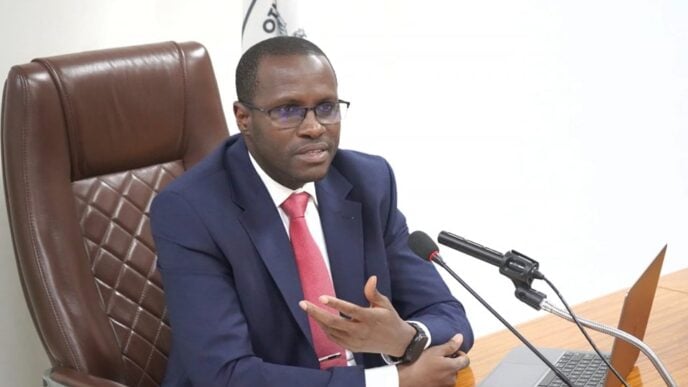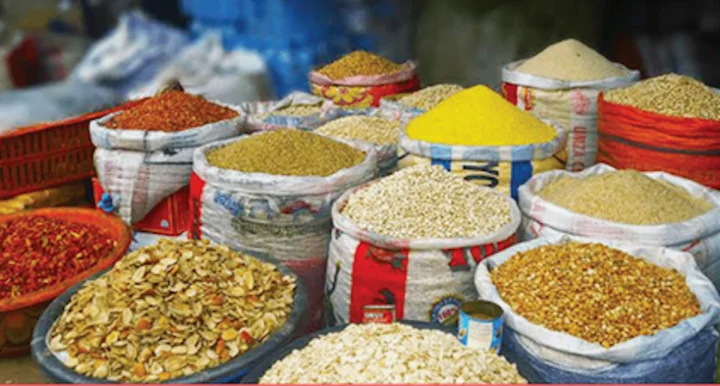The senate | File photo
The senate has begun moves to cut Nigeria’s $2 billion rice import bill by establishing a national rice council to boost local production and strengthen food self-sufficiency.
A bill sponsored by Adamu Aliero, senator representing Kebbi central, aims to establish the Rice Development Council of Nigeria to coordinate research, regulate production standards, support farmers, and promote innovation across the rice value chain.
Speaking at a public hearing on the bill alongside the Cassava Inclusion and Flour Production Bill and the National Food Reserve Agency Bill, Senate President Godswill Akpabio, represented by Mohammed Monguno, senate chief whip, said the measures align with President Bola Tinubu’s Renewed Hope Agenda for agricultural and economic transformation.
“The Rice Development Council of Nigeria Bill represents our economic firepower, poised to create millions of jobs, reduce foreign exchange spending on importation, and make Nigeria Africa’s rice powerhouse,” Akpabio said.
Advertisement
“By passing this bill, we will drive research, innovation, and value chain development, ensuring our children inherit a prosperous future.”
Akpabio added that the three agricultural bills could reshape Nigeria’s food system.
While the cassava inclusion bill would stimulate agro-industrial growth and employment, he said, the food reserve agency bill would provide a safety net against shortages caused by climate change and global disruptions.
Advertisement
BILL TO DRIVE LOCAL PRODUCTION
Salihu Mustapha, chairman of the senate committee on agricultural production, services and rural development, described rice as the staple on nearly every Nigerian table but lamented inefficiencies in the sector despite the capacity to produce more than seven million metric tonnes annually.
“This bill heralds a dedicated council to orchestrate research, extension services, and value chain innovations, from flood-resistant seeds to modern milling technologies,” Mustapha said.
“It promises to slash our $2 billion import dependence, ignite agro-industrial hubs across the north and south, and elevate our farmers from subsistence to commercial stardom.”
Advertisement
Mustapha said the council would ensure inclusivity by engaging women and youth in agribusiness.
“It is a blueprint for turning paddy fields into prosperity engines and positioning Nigeria as Africa’s rice powerhouse,” he added.
STAKEHOLDERS BACK PROPOSED RICE COUNCIL
The Rice Millers Association of Nigeria (RIMAN) backed the bill, describing it as a timely intervention that could unlock Nigeria’s full potential in rice production.
Advertisement
Peter Dama, RIMAN national chairman, highlighted challenges such as insecurity, poor irrigation, and lack of mechanisation, and called for deliberate promotion of climate-smart agricultural practices.
“There should be deliberate promotion of climate-smart agricultural production innovations, including research for high-yield resilient seeds and renewable energy to power irrigation,” Dama said.
Advertisement
“Rice is not just a meal on the table; it is a political and economic staple. It plays a role in palliatives for distressed communities, contributes to national GDP, and provides livelihoods for millions.”
RIMAN proposed amendments to the bill, including the inclusion of financial institutions such as NIRSAL, the Bank of Agriculture (BOA), Bank of Industry (BOI), National Agricultural Insurance Corporation (NAIC), and the National Agricultural Development Fund (NADF) on the council’s governing board.
Advertisement
Dama said since the Central Bank of Nigeria (CBN) no longer funds agricultural development directly, it should be replaced with these specialised institutions.
He also recommended six zonal offices to enhance regional programme delivery and seven technical committees for areas such as research, quality control, marketing, rice fortification, and gender equity.
Advertisement
Dama aligned the initiative with the National Rice Development Strategy II (2020–2030) and urged the conversion of the existing rice desk in the federal ministry of agriculture and food security into a full-fledged council for stronger coordination.
The Women Farmers Advancement Network (WOFAN) also expressed strong support for the bill, describing it as a game-changer that would create millions of job opportunities for women and youth across the rice value chain.
Speaking on behalf of the organisation, Maryam Lawal urged the senate to ensure the bill’s swift passage, saying it would enhance food security and empower communities.
“WOFAN worked with CARF, RIMAN, RIPAIN, and other stakeholders on the Rice Council Bill from 2020 to 2023 when it was passed by the 9th senate,” she said.
“However, the president’s assent was delayed until the bill lapsed, and it had to be re-presented in 2024. We are therefore confident that the 10th senate will pass it again, and this time, it will be signed into law accordingly.”












